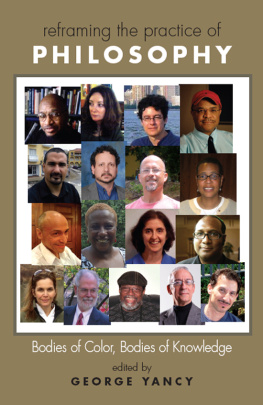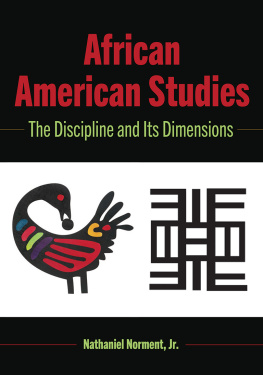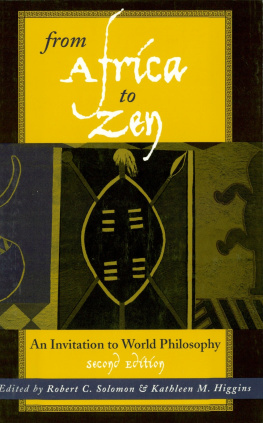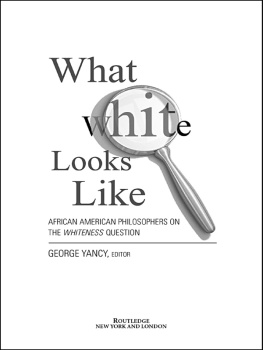Robert Bernasconi and T. Denean Sharpley-Whiting, editors
REFRAMING THE PRACTICE OF PHILOSOPHY
Bodies of Color, Bodies of Knowledge
EDITED BY
GEORGE YANCY
STATE UNIVERSITY OF NEW YORK PRESS
Published by
STATE UNIVERSITY OF NEW YORK PRESS, ALBANY
2012 State University of New York
All rights reserved
Printed in the United States of America
No part of this book may be used or reproduced in any manner whatsoever without written permission. No part of this book may be stored in a retrieval system or transmitted in any form or by any means including electronic, electrostatic, magnetic tape, mechanical, photocopying, recording, or otherwise without the prior permission in writing of the publisher.
For information, contact
State University of New York Press, Albany, NY
www.sunypress.edu
Production, Laurie Searl
Marketing, Anne M. Valentine
Library of Congress Cataloging-in-Publication Data
Reframing the practice of philosophy : bodies of color, bodies of knowledge / edited by George Yancy.
p. cm. (SUNY series, Philosophy and race)
Includes bibliographical references and index.
ISBN 978-1-4384-4002-6 (pbk. : alk. paper)
ISBN 978-1-4384-4003-3 (hardcover : alk. Paper)
1. Philosophy and social sciences. 2. MinoritiesUnited States. I. Yancy, George.
B63.R42 2012
108dc22 2011010849
10 9 8 7 6 5 4 3 2 1
To philosophers of color not yet born
ACKNOWLEDGMENTS

The contributors within this volume are thanked for their collective effort to produce a text that fills an important philosophical gap. I recall sharing this project with the noted literary figure and philosopher Charles Johnson. Aware of my other edited volumes, Johnson said, You're filling in whole quadrants of philosophical exploration that have for too long been neglected! His expression and insight brought home to me my own sense of purpose. I thank Chuck for that. I also thank Philosophy and Race Series editors T. Denean Sharpley-Whiting and Robert Bernasconi for their initial assesment of the importance of this project. I would like to thank Jane Bunker, former Associate Director and Editor-in-Chief of SUNY Press, for her leadership in terms of promoting excellence in publishing, her encouragement, and especially her patience. I also thank Andrew Kenyon, Assistant Acquisitions Editor, for his support and Laurie Searl, Senior Production Editor, for her energy and creative ideas. I thank a number of colleagues for their continued insights and support: James G. Spady, Fred Evans, Jim Swindal, Kathy Glass, Steve Martinot, Manomano M.W. Mukungurutse, Maria Del Gaudalupe Davidson, Janine Jones, J. Everet Green, Mariana Ortega, Clevis Headley, Robert E. Birt, Lucius T. Outlaw Jr., Cornel West, and Anita Allen. I would like to especially thank Joyce M. Cook. She is a dear friend and an enviable philosopher; indeed, one of a kind. Ruth, my mother, is thanked for the breath (the life) that she gave me. The Yancy boys are products of that same loving breath. And to Susan, my wife, thanks for your endurance and work ethic, but especially for your patience with a man who continues to learn how to unlearn.
INTRODUCTION
INAPPROPRIATE PHILOSOPHICAL SUBJECTS?

George Yancy
I found that it was extremely important to legitimate the production of philosophical knowledge in sites that are not normally considered the philosophical sites.
Angela Davis
It is difficult to hate people whose culture is understood, but easy to hate people who are imagined to embody a label that means inferior or dangerous.
Naomi Zack
The vision for Reframing the Practice of Philosophy: Bodies of Color, Bodies of Knowledge emerged from a conversation with Jorge J. E. Gracia. We discussed the paucity of African Americans and Latinos/as in the field of philosophy in the United States despite the fact that the twenty-first century had arrived. Our goal was to create a critical space where both groups would come together to discuss critically a collectively important defining theme, a common problemour marginalization within the profession of philosophy, which is one of those inappropriate philosophical subjects. We conceived that this critical cadre would come together in the form of a session at one of the American Philosophical Association (APA) meetings. The idea was exciting and the fruitful possibilities endless.
As we continued to think about this, I thought that I would also edit a text that brought together African American and Latino/a philosophical voices. Initially, I thought that the text principally would reflect the concern that Jorge and I had contemplated with respect to the APA sessionthe concern regarding such appallingly low numbers of African Americans and Latinos/as in the field of philosophy. The book would function as a textual site that raised critical questions about the status of African Americans and Latinos/as in the predominately white and male field of philosophy. The idea was to locate and interrogate ways in which the profession of philosophy actually militates against the presence of these two groups. After thinking through the project with greater conceptual precision, however, it grew into its current form.
The text indeed does succeed in bringing together African American and Latino/a philosophers within a single text. Yet, the critical and conceptually complex and diverse yield was unexpected. In this sense, the project itself is truly dynamic. The attempt to explore and explicate the lack of African Americans and Latinos/as in the field of philosophy actually resulted in a much broader and comprehensive text that uncovered complex and multifaceted issues such as alienation, institutional prejudices, insidious racism, canonical exclusion, linguistic exclusion, nonrecognition, disrespect, white hegemony and power, discursive silencing, philosophical territorial arrogance, and indignation. In short, what emerged was a powerful and multilayered exposureby these two collective critical philosophical voicesof the implicit and explicit ideologically and philosophically myopic exclusionary practices that shape and inform contemporary philosophy as practiced in North America.
I began to see just how important the text had become beyond the scope of low numbers, particularly in terms of the text's forward-looking dimensions. The text constitutes an important sitea textual balm of sortsfor blacks and Latinos/as currently pursuing degrees in philosophy and who, as a result, may feel isolated, out of place, and marginalized. Moreover, the text speaks to future philosophers of color who might need confirmation of their sanity, a collective voice that says, We also know your pain, your blues. Yet, it is a text that encouragesvalorizesthe importance of talking back. As bell hooks writes, It is that act of speech, of talking back, that is no mere gesture of empty words, that is the expression of our movement from object to subjectthe liberated voice.
As the text continued to take shape, what also began to emerge was a parallel between many of the issues that black and Latino/a bodies experience within the everyday world of social perception as linked to pervasive de facto racism, and the refined and intellectually highfalutin world of professional philosophy. This confirmed what I had always thought to be the case. Philosophical academic spaces are, in so many ways, continuous with everyday, politically invested, racially grounded, prejudicial, social spaces. Such normative (white) academic spaces are shot through with much of the same racist toxicity that configures black and brown bodies as outside the normative (white) Demos. Blacks and Latinos/as are seen/depicted as possessing an essential (noncontingent) tendency toward laziness, drug abuse and dealing, poor linguistic skills, unreliability, and so on.













